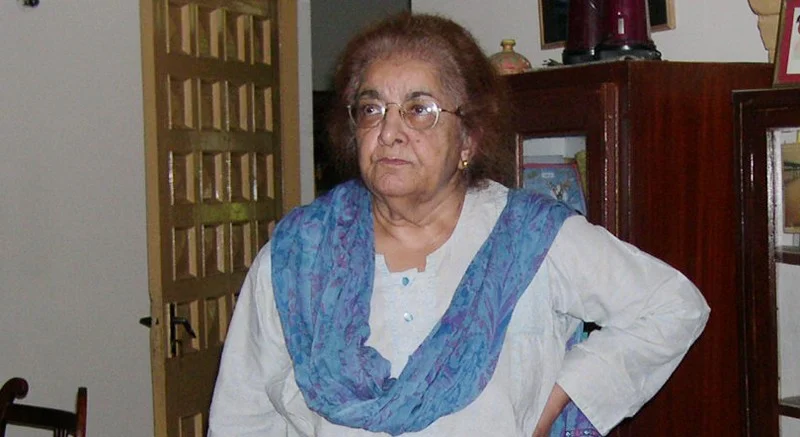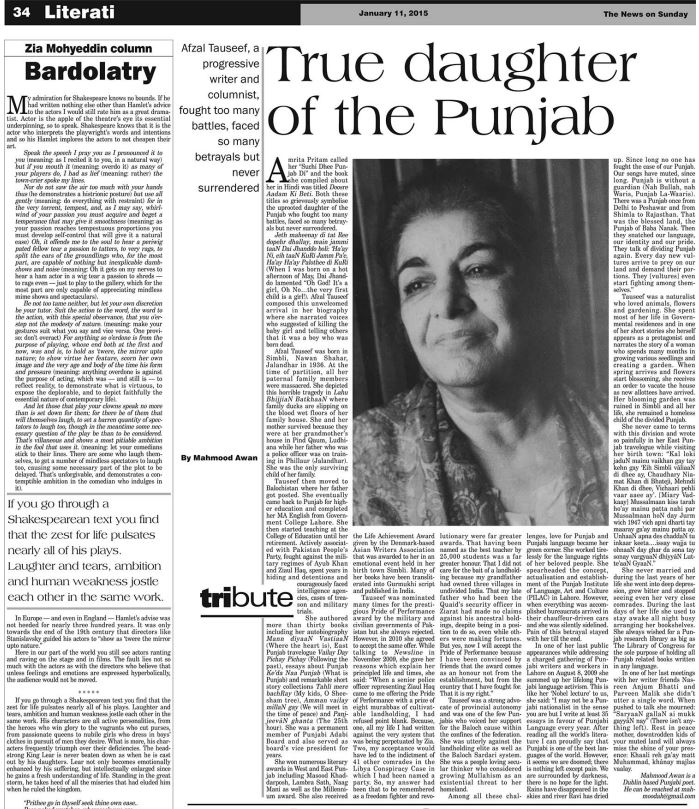Mahmood Awan (The News on Sunday, 8th December 2013)
Amrita Pritam called her “Suchi Dhee Punjab Di” and the book she compiled about her in Hindi was titled Doosre Aadam Ki Beti. Both these titles so grievously symbolise the uprooted daughter of the Punjab who fought too many battles, faced so many betrayals but never surrendered.
Jeth maheenay di tat Ree dopehr dhallay, main jammi taaN Dai Jhanddo boli: ‘Ha’ay Ni, eih taaN KuRi Jamm Pa’e, Ha’ay Ha’ay Palothee di KuRi (When I was born on a hot afternoon of May, Dai Jhanddo lamented “Oh God! It’s a girl, Oh No…the very first child is a girl!). Afzal Tauseef composed this unwelcomed arrival in her biography where she narrated voices who suggested of killing the baby girl and telling others that it was a boy who was born dead.
Afzal Tauseef was born in Simbli, Nawan Shahar, Jalandhar in 1936. At the time of partition, all her paternal family members were massacred. She depicted this horrible tragedy in Lahu BhijjiaN BatkhaaN where family ducks are slipping on the blood wet floors of her family house. She and her mother survived because they were at her grandmother’s house in Pind Qaum, Ludhiana while her father who was a police officer was on training in Phillaur (Jalandhar). She was the only surviving child of her family.
Tauseef then moved to Balochistan where her father got posted. She eventually came back to Punjab for higher education and completed her MA English from Government College Lahore. She then started teaching at the College of Education until her retirement. Actively associated with Pakistan People’s Party, fought against the military regimes of Ayub Khan and Ziaul Haq, spent years in hiding and detentions and courageously faced intelligence agencies, cases of treason and military trials.
She authored more than thirty books including her autobiography Mann diyaaN VastiaaN (Where the heart is), East Punjab travelogue Vailay Day Pichay Pichay (Following the past), essays about Punjab Ke’da Naa Punjab (What is Punjab) and remarkable short story collections Tahli mere bachRay (My kids, O Sheesham tree), Amman vailay millaN gay (We will meet in the time of peace) and PanjjeevãN ghanta (The 25th hour). She was a permanent member of Punjabi Adabi Board and also served as board’s vice president for years.
She won numerous literary awards in West and East Punjab including Masood Khaddarposh, Lambra Sath, Naag Mani as well as the Millennium award. She also received the Life Achievement Award given by the Denmark-based Asian Writers Association that was awarded to her in an emotional event held in her birth town Simbli. Many of her books have been transliterated into Gurmukhi script and published in India.
Tauseef was nominated many times for the prestigious Pride of Performance award by the military and civilian governments of Pakistan but she always rejected. However, in 2010 she agreed to accept the same offer. While talking to Newsline in November 2009, she gave her reasons which explain her principled life and times, she said: “When a senior police officer representing Ziaul Haq came to me offering the Pride of Performance with a prize of eight murabbas of cultivatable landholding, I had refused point blank. Because, one, all my life I had written against the very system that was being perpetuated by Zia. Two, my acceptance would have led to the indictment of 41 other comrades in the Libya Conspiracy Case in which I had been named a party. So, my answer had been that to be remembered as a freedom fighter and revolutionary were far greater awards. That having been named as the best teacher by 25,000 students was a far greater honour. That I did not care for the bait of a landholding because my grandfather had owned three villages in undivided India. That my late father who had been the Quaid’s security officer in Ziarat had made no claims against his ancestral holdings, despite being in a position to do so, even while others were making fortunes. But yes, now I will accept the Pride of Performance because I have been convinced by friends that the award comes as an honour not from the establishment, but from the country that I have fought for. That it is my right.”
Tauseef was a strong advocate of provincial autonomy and was one of the few Punjabis who voiced her support for the Baloch cause within the confines of the federation. She was utterly against the landholding elite as well as the Baloch Sardari system. She was a people loving secular thinker who considered growing Mullahism as an existential threat to her homeland.
Among all these challenges, love for Punjab and Punjabi language became her green corner. She worked tirelessly for the language rights of her beloved people. She spearheaded the concept, actualisation and establishment of the Punjab Institute of Language, Art and Culture (PILAC) in Lahore. However, when everything was accomplished bureaucrats arrived in their chauffeur-driven cars and she was silently sidelined. Pain of this betrayal stayed with her till the end.
In one of her last public appearances while addressing a charged gathering of Punjabi writers and workers in Lahore on August 8, 2009 she summed up her lifelong Punjabi language activism. This is like her ‘Nobel lecture’ to us, she said: “I may not be a Punjabi nationalist in the sense you are but I write at least 35 essays in favour of Punjabi Language every year. After reading all the world’s literature I can proudly say that Punjabi is one of the best languages of the world. However, it seems we are doomed; there is nothing left except pain. We are surrounded by darkness, there is no hope for the light. Rains have disappeared in the skies and river Ravi has dried up. Since long no one has fought the case of our Punjab. Our songs have muted, since long. Punjab is without a guardian (Nah Bullah, nah Waris, Punjab La-Waaris). There was a Punjab once from Delhi to Peshawar and from Shimla to Rajasthan. That was the blessed land, the Punjab of Baba Nanak. Then they snatched our language, our identity and our pride. They talk of dividing Punjab again. Every day new vultures arrive to prey on our land and demand their portions. They [vultures] even start fighting among themselves.”
Tauseef was a naturalist who loved animals, flowers and gardening. She spent most of her life in Governmental residences and in one of her short stories she herself appears as a protagonist and narrates the story of a woman who spends many months in growing various seedlings and creating a garden. When spring arrives and flowers start blossoming, she receives an order to vacate the house as new allottees have arrived. Her blooming garden was ruined in Simbli and all her life, she remained a homeless child of the divided Punjab.
She never came to terms with this division and wrote so painfully in her East Punjab travelogue while visiting her birth town: “Kal loki jaduN mainu vaikhan gay tay kehn gay ‘Eih Simbli vãliaaN di dhee ay, Chaudhary Niamat Khan di Bhateji, Mehndi Khan di dhee, Vichaari pehli vaar aaee ay’. [Miary Vadkaay] Mussalmaan kiss tarah ho’ay mainu patta nahi par Mussalmaan hoN day Jurm wich 1947 vich apni dharti tay maaray ga’ay mainu patta ay. UnhaaN apna des chaddaN tu inkaar keeta….issay wajja tu ohnaaN day ghar da sona tay sonay vargyaaN dhiyyãN Lutte’aaN GyaaN.”
She never married and during the last years of her life she went into deep depression, grew bitter and stopped seeing even her very close comrades. During the last days of her life she used to stay awake all night busy arranging her bookshelves. She always wished for a Punjab research library as big as The Library of Congress for the sole purpose of holding all Punjab related books written in any language.
In one of her last meetings with her writer friends Nasreen Anjum Bhatti and Parveen Malik she didn’t utter a single word. When pushed to talk she mourned: “SaryaaN gallaN ai mukk gayyãN nay” (There isn’t anything left). Rest in peace mother, downtrodden kids of your muted land will always miss the shine of your presence: Khaali reh ga’ay matt Muhammad, khãnay majlas vaalay.
Published on 8th December 2013 in The News on Sunday.
https://www.thenews.com.pk/tns/detail/557822-afzal-tauseef-true-daughter-of-punjab


